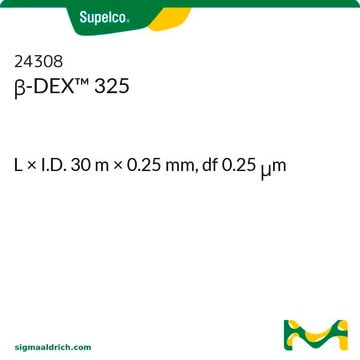13024AST
Astec® CHIROBIOTIC® R Chiral (5 μm) HPLC Columns
L × I.D. 25 cm × 4.6 mm, HPLC Column
Sinónimos:
Chiral Recognition HPLC Column
About This Item
Productos recomendados
product name
Astec® Chirobiotic® R Chiral HPLC Column, 5 μm particle size, L × I.D. 25 cm × 4.6 mm
material
stainless steel column
Quality Level
description
HPLC column
product line
Astec®
packaging
pkg of 1 ea
manufacturer/tradename
Astec®
parameter
0-45 °C temperature
241 bar pressure (3500 psi)
technique(s)
HPLC: suitable
LC/MS: suitable
L × I.D.
25 cm × 4.6 mm
matrix
high-purity silica gel particle platform
fully porous particle
matrix active group
ristocetin A glycopeptide phase
particle size
5 μm
pore size
100 Å
operating pH range
3.5-6.8
separation technique
chiral
¿Está buscando productos similares? Visita Guía de comparación de productos
General description
- Bonded phase: Ristocetin A
- Operating pH range: 3.5 - 6.8
- Particle diameter: 5, 10 or 16 μm
- Pore size: 100 Å
CHIROBIOTIC FAQs
CHIROBIOTIC Reference Bibliography
Chiral Product Literature
Application
- Sensitive Determination of Lactic Acid Isomers: The Astec® CHIROBIOTIC® R Chiral HPLC Column was crucial in a study by Henry H et al., where it facilitated the sensitive determination of D-lactic acid and L-lactic acid in urine using high-performance liquid chromatography-tandem mass spectrometry. This method is pivotal for clinical diagnostic applications, showcasing the column′s ability to resolve similar compounds that are challenging to differentiate by other means (Henry H et al., 2012).
- Enantioseparation of Cyclopentanecarboxylic and Cyclohexanecarboxylic Acids: The column was also utilized by Berkecz R et al. to achieve high-performance liquid chromatographic enantioseparation of complex 2-aminomono- and dihydroxycyclopentanecarboxylic and 2-aminodihydroxycyclohexanecarboxylic acids. This application underscores the column′s versatility and efficacy in separating closely related chiral acids, essential for biochemical research and pharmaceutical product development (Berkecz R et al., 2009).
Legal Information
Elija entre una de las versiones más recientes:
¿Ya tiene este producto?
Encuentre la documentación para los productos que ha comprado recientemente en la Biblioteca de documentos.
Protocolos
Rapid, simple, reproducible chiral separation and quantification of L- and D-lactic acid enantiomers using Supelco’s Astec CHIROBIOTIC® R chiral column and tandem MS.
Rapid, simple, reproducible chiral separation and quantification of L- and D-lactic acid enantiomers using Supelco’s Astec CHIROBIOTIC® R chiral column and tandem MS.
Rapid, simple, reproducible chiral separation and quantification of L- and D-lactic acid enantiomers using Supelco’s Astec CHIROBIOTIC® R chiral column and tandem MS.
Rapid, simple, reproducible chiral separation and quantification of L- and D-lactic acid enantiomers using Supelco’s Astec CHIROBIOTIC® R chiral column and tandem MS.
Chromatograms
application for HPLCapplication for HPLCapplication for HPLCapplication for HPLCMostrar másNuestro equipo de científicos tiene experiencia en todas las áreas de investigación: Ciencias de la vida, Ciencia de los materiales, Síntesis química, Cromatografía, Analítica y muchas otras.
Póngase en contacto con el Servicio técnico



